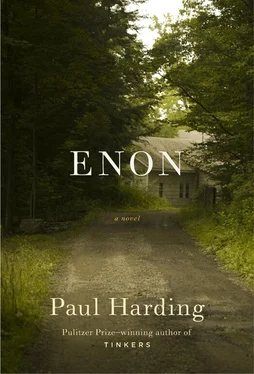Paul Harding - Enon
Здесь есть возможность читать онлайн «Paul Harding - Enon» весь текст электронной книги совершенно бесплатно (целиком полную версию без сокращений). В некоторых случаях можно слушать аудио, скачать через торрент в формате fb2 и присутствует краткое содержание. Жанр: Современная проза, на английском языке. Описание произведения, (предисловие) а так же отзывы посетителей доступны на портале библиотеки ЛибКат.
- Название:Enon
- Автор:
- Жанр:
- Год:неизвестен
- ISBN:нет данных
- Рейтинг книги:3 / 5. Голосов: 1
-
Избранное:Добавить в избранное
- Отзывы:
-
Ваша оценка:
- 60
- 1
- 2
- 3
- 4
- 5
Enon: краткое содержание, описание и аннотация
Предлагаем к чтению аннотацию, описание, краткое содержание или предисловие (зависит от того, что написал сам автор книги «Enon»). Если вы не нашли необходимую информацию о книге — напишите в комментариях, мы постараемся отыскать её.
Powerful, brilliantly written, and deeply moving Paul Harding has, in Enon, written a worthy successor to Tinkers, a debut which John Freeman on NPR called "a masterpiece." Drawn always to the rich landscape of his character's inner lives, here, through the first person narrative of Charlie Crosby (grandson to George Crosby of Tinkers), Harding creates a devastating portrait of a father trying desperately to come to terms with family loss.
Enon — читать онлайн бесплатно полную книгу (весь текст) целиком
Ниже представлен текст книги, разбитый по страницам. Система сохранения места последней прочитанной страницы, позволяет с удобством читать онлайн бесплатно книгу «Enon», без необходимости каждый раз заново искать на чём Вы остановились. Поставьте закладку, и сможете в любой момент перейти на страницу, на которой закончили чтение.
Интервал:
Закладка:
I started back across the hilltop, intending to sneak away without the girls noticing me and maybe getting scared, ruining their good cheer. I must have grunted or something, I’m not sure what, but I made a noise and the laughing stopped. I froze and the girls froze.
“Carl?” one of the girls called. “Carl, is that you ?” For all I’d been through in the past year, I felt more petrified than at any other time. Christ, I’m going to jail tonight after all, I thought, imagining the girls shrieking and being frightened half to death at the sight of me, soaking and strung out and wretched.
“Carl, cut the shit; I’m serious .”
As idiotic as I felt, I croaked out, “Um, no. Ah, hi. It’s not — Carl. I’m—”
The girls got up on their knees. I dropped my sweatshirt and started walking toward them, with my hands out at my sides, almost like I was approaching a skittish animal. I didn’t know what else to do.
“Who’s that?” one of the girls asked.
“Sorry,” I said. “Sorry. I didn’t mean to sneak — I mean, I didn’t know you guys were there.”
“Who are you?” the girl repeated.
“Well,” I said, “I’m Charlie.” It sounded so strange to say that. It felt so odd that there was nothing else I could say to these young girls, girls near to my daughter’s age, that the only appropriate thing for me to say seemed to be nothing more than my name.
“Charlie, huh?” the other girl said. They both stood up. One of the girls was noticeably taller than the other, very slim, with dark eyes. She wore a black sweatshirt with the hood pulled over her head. Her long, snaky, jet-black hair cascaded out from the hood and down the front of the sweatshirt. She stood a step in front of the other girl, who was fairer, with lighter eyes. The other girl’s hair had been dyed black, too, but she’d let it half-revert back to its natural red color. She wore a black leather jacket that had a white skull with a Mohawk and the word EXPLOITED spray-painted across the front of it. She wore a black skirt with black leggings and high, heavy black leather biker boots. They were trying to be cool, but they were nervous. I thought of Kate and felt like they were not being nervous enough. I walked toward them until I stood about ten feet away. I deliberately kept my body turned a third away from them, to show that I wasn’t going to move any closer in their direction.
“Sorry, guys,” I said. I looked down at my soaking, muddied self. “Sorry. I’m not having”—I wasn’t sure what to say—“such a good night.”
The shorter girl elbowed the taller girl and the taller said, “Ohh; it’s you .”
“Sorry—” I said. “It’s me?”
“Yeah, it’s you — Kate’s dad.”
I knew they knew. It was as simple as that, but I still feigned a little. “ ‘Kate’s dad’? What are you talking about?”
“Kate’s dad,” the girl said. “You’re Kate’s dad. The kid — the girl — that died last year. The eighth grader. You’re her dad, right?”
“Right,” I said. “Yeah, that’s right, but—”
“Don’t worry, man,” the girl said. “It’s okay. Kind of everyone knows.”
“Everyone knows what?” I said.
“Yeah. I mean, the guys know. I mean, these older guys we kind of know, at school, and some girls; they’ve seen you walking around at night a few times. Everyone kind of knows about you. I mean, not the cops or the parents, just some of us. No one told them it was you that did that break-in. We know you walk all around at night. Everyone kind of thinks it’s cool.”
The other girl said, “We know right where Kate is, right down there. We talk about her sometimes.”
“Talk to her sometimes.”
“Yeah, to her.”
“We saw her once.”
“Right down there, by her stone.”
“She was, like, made of the shadows.”
“Yeah, or like inside the shadows, but we knew it was her.”
“We could tell from her hair.”
“Yeah. Her hair was really pretty. Really, really black.”
“But black because of the lights moving around in it, kind of.”
“Yeah, it was really weird. But she was so beautiful. I mean, really, really beautiful.”
“Yeah, we really kind of fell in love with her.”
Just like Kate fell in love with the idea of Sarah Good, I thought. The taller girl took a drag of her cigarette. She took a half-step forward and offered it to me.
She said, “Dude, you look like you need a smoke .” But then she stepped back and dropped her face a little, as if suddenly remembering her manners in front of an adult.
I said to her, “Your name’s not Sarah by any chance, is it?”
“No, I’m Lilly,” she said.
“And I’m Caroline,” the other girl said.
“How many times did you say you’ve seen my daughter?”
“A bunch—”
“A couple—”
“Once for sure.”
I thought: Jesus, these kids know about me? I thought: Jesus, Lilly and Caroline, in the cemetery, drinking some white wine you pinched from your moms, playing with tarot cards, probably getting okay grades, probably going to decent colleges in a year or two, trying to work things out, trying to be good kids, really.
“Lilly and Caroline,” I said. “What a couple of lovely”—I wasn’t sure what to call them: girls, women? — “souls you are.” I felt mortified, too, though, soaking wet and strung out, talking and sharing a cigarette with teenage girls in the cemetery late at night, with evidently half the kids in the village aware of what I’d been doing for the past year, and these two not as frightened by me as they rightly should have been. But it felt like a spell had been broken, too.
I stammered a vague thank-you, suddenly not wanting to explain the facts of the night, charmed by these kids but suddenly wanting nothing more than to be home. So I told them that they didn’t know how much they had helped me and I didn’t know what else more to say but thank you.
“No problem, my man,” Caroline said.
“That’s what we’re here for,” Lilly said.
“Well, your secret’s good with me, you guys. Just — ah — be careful, okay? Take it easy with the booze and those smokes, all right?”
“Okay, Mr. Charlie.”
“Okay, Dad .”
I laughed out loud at that. As ridiculous and reduced and outrageous as the whole situation was, it was nice to be called dad, and in that funny, smart, sarcastic girl’s voice.
“Bye, guys,” I said. I turned away and limped down the hill toward the road.
Lilly called out in a loud whisper, “Hey, Mr. Charlie?”
I stopped and turned around and whispered back, “Yeah?”
“We’re really sorry Kate died.”
Caroline whispered, “Yeah. We bet she was a really good kid.”
14
KATE AND I SHARED A LAST MEAL IN THE TWILIT REALM I HAD invented for her. The meal was the same meager supper I had provided when she first arrived in that other world, but reversed. I had imagined the world, colonized it, and come ahead of her in order to build a stone-ringed fire pit and a wigwam of lashed saplings covered over with bark and insulated with straw, and to make a sooty fire and to toast some meal cakes. She sat on a bench made from a planed log, wrapped in a shawl, pale, gray even, ill from the rise and drop of the ocean. The wigwam was smoky and dark and cramped. The floor was covered with dirty straw. Kate nibbled at her empty fingertips until a pinch of crumbs appeared kneaded up between them. A corner of tasteless cake grew in her hand. Once it formed into a square, Kate removed it from in front of her mouth and handed it to me. I placed it back into a pan resting next to the coals and traced its outline with a knife and it joined back into the rest of the cake behind the blade. Kate stood up and stepped backward toward the doorway. I shuffled back from the hearth and stepped behind her and we both left the house, watching it recede into the trees. We struggled for a mile and a half, through trees and meadows, scrub and dune grass, our backs to our destination, Kate’s seasickness getting worse along the way, until we arrived at the shore. When we reached the smooth stones and clotting seaweed and the first waves soaked our feet and curled back up into themselves, I turned around to face Kate and the ocean. We embraced and I turned her over to a lean, half-starved, sunburned sailor, who stood in the water up to his knees in front of a dinghy. A small, battered, and dark caravel with tattered lateen sails lay a hundred yards offshore. The sailor took Kate’s hand and she, watching me, backed up over the side of the dinghy and onto one of its two benches. The sailor pushed the boat into the water by the bow, leapt into it, took up a pair of oars, inserted them into the tholes, and began to row the boat backward toward the ship. When the dinghy reached the ship, I could see Kate stand and be raised up to its deck by two men on board. The sailor who rowed her to the ship climbed up a rope ladder. The dinghy was pulled up with a windlass and stowed. The ship raised anchor and began to draw back across the ocean, stern first. I backed up across the sand slowly until I stood on slightly higher ground, near the edge of the dune grass. I watched the ship for hours, as it receded and diminished, until its small sails sank and disappeared beneath the horizon. I watched the empty ocean for hours afterward. The sun dropped through the sky and followed the ship off the eastern ledge of the world. The sunlight spread across the far line of the flat earth and dimmed into full night.
Читать дальшеИнтервал:
Закладка:
Похожие книги на «Enon»
Представляем Вашему вниманию похожие книги на «Enon» списком для выбора. Мы отобрали схожую по названию и смыслу литературу в надежде предоставить читателям больше вариантов отыскать новые, интересные, ещё непрочитанные произведения.
Обсуждение, отзывы о книге «Enon» и просто собственные мнения читателей. Оставьте ваши комментарии, напишите, что Вы думаете о произведении, его смысле или главных героях. Укажите что конкретно понравилось, а что нет, и почему Вы так считаете.












